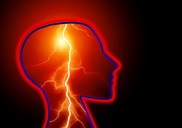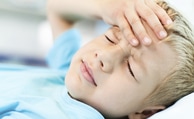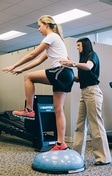|
Now that you have recognized the symptoms of a concussion in one of your athletes, what is the next step to take? Managing the symptoms of a concussion appropriately is the best thing you can do to get that athlete back into their sport.  Unfortunately, there is no specific cure out there for concussions and managing the symptoms that are present is the treatment of choice. Fortunately, with proper management, the majority of concussions resolve spontaneously with no long-term effects. Some symptoms may take longer to recover from than others. Also, younger athletes tend to take longer to recover than older athletes, which is the opposite trend that we tend to see from musculoskeletal injuries. Symptoms that take longer to recover from include:
In the early stages after a concussion, the symptoms listed in Part 1 of this series are expected to be present and are normal. However there are some symptoms that may begin to develop over the first few days that are concerning and require immediate medical attention at an emergency department. Symptoms to look out for include the following:
 Next we will look at some of the most common symptoms of a concussion and strategies that can be used to help treat these symptoms. Headaches: One of the more serious concerns following a concussion is the potential of a brain bleed. While extremely rare following a concussion, it needs to be kept in mind as a bleed is very serious. For the first few days, Tylenol can be used to treat the headaches as it will not impact any potential bleeding. If there are no signs of a bleed after a few days (any of the critical symptoms listed above), the athlete is free to take anti-inflammatory medication to help with the headaches. Some research shows that there is often some inflammation following a concussion, and anti-inflammatory medications can help with this. On the topic of medications, if an athlete was taking any other prescription medications prior to the injury, they should continue to take those.  Sleep: How often do you hear that concussed individuals need to be woken up every couple hours when they are sleeping during the first night? If you are concerned enough to feel the need to wake the athlete up every hour or 2 while they are sleeping, they need to go to the emergency department for further testing. Sleep is one of the most important aspects of the initial recovery following a concussion as rest allows the brain to recover from injury. If the athlete is having trouble sleeping or staying asleep through the night, sleep aides such as melatonin can be used. Taking naps throughout the day as necessary is another way to make sure that the athlete is getting enough sleep each day.  The Environment: Minimizing exposure to visual and audio stimuli is also important to allow the brain to rest and recover from the injury. Staying away from the following will make daily life more comfortable for the individual:
 How Can a Physical Therapist Help? Most of the remaining common symptoms that we see are things that a physical therapist can help with
 Return to School Some athletes may need to stay home the first few days following the concussion, which is okay and beneficial for recovery. It is important, however, to get them back to normal day-to-day function. Shutting the athlete off from stimulus completely for a prolonged period will make it harder for them to adapt once they return. Try to arrange for accommodations rather than complete removal from school after the first few days depending on the symptoms they are having (such as having extra time to change classes if there is too much stimulus from other students or having pre-printed notes opposed to having to look at computer or screen) It is also important to restrict physical exertion during the school day such as physical education class, choir, band, or any other class that will provide too much stimulus for the individual to cope with. Managing these symptoms early and getting the athlete with a physical therapist will decrease the recovery time and get the athlete back to normal life faster. As mentioned, with proper management of the symptoms, most athletes will fully recover from a concussion. This is Part II of a 3 part series, Click Here for Part I, Click Here for Part III
1 Comment
|
Archives
April 2022
Categories
All
Disclaimer: The information contained on this website is compiled from a variety of professional sources as well as the author's own experiences. The information should NOT be used in place of a visit to your healthcare provider or used to disregard any advice provided by your healthcare provider.
|

 RSS Feed
RSS Feed